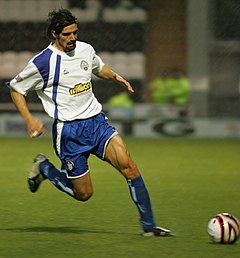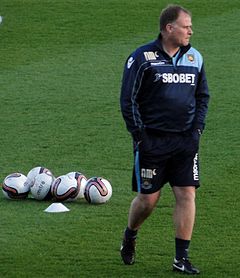Östersunds FK – Wikipedia
Association football club in Östersund, Sweden
Football club
Östersunds Fotbollsklubb, commonly known simply as Östersunds FK, Östersund (Swedish pronunciation: [œstɛˈʂɵnːd]) or (especially locally) ÖFK, is a Swedish professional football club located in Östersund, Sweden, that plays in the Swedish second tier, Superettan. The club was formed in 1996 as a merger of several Östersund clubs. The club is affiliated with the Jämtland-Härjedalens Fotbollförbund[2] and play their home games at Jämtkraft Arena. The club colours, reflected in their crest and kit, are red and black, predominantly in stripes and with red shorts and socks.
From its creation, the club played mostly in the third tier of Swedish football but in 2013 Östersund achieved promotion to the second tier, Superettan, after achieving two consecutive promotions. In 2016 Östersund was promoted to the Swedish first tier, Allsvenskan, for the first time.[3] In 2017, Östersund won the Svenska Cupen and qualified for the UEFA Europa League. The club was relegated to Superettan in 2021.[4]
The name ‘Östersunds’ is in a possessive clause in the Swedish language, which means it is incorrect to call the club anything other than Östersund in a short form based on the town name.
Background[edit]
Östersunds FK was created in 1996 when the three local clubs Ope IF, IFK Östersund and Östersund/Torvalla FF merged, aiming to create a club in that would be able to establish itself in the top two tiers of Swedish football. The next year Frösö IF also joined the project. The newly formed club started out their existence in the third tier in 1997 and Östersund/Torvalla FF ceased to exist as a consequence.[5] IFK Östersund, Ope IF och Östersund/Torvalla FF (ÖTFF). In 2000 a fifth club, Fältjägarnas IF, was also merged into the club.
During the 2000s the club started taking on an English flavour and in 2007 the director of football Daniel Kindberg used his friendship with coaches Roberto Martínez and Graeme Jones to start a cooperation with Swansea City where Östersund would loan young players from the club. Swansea also came over to Östersund to play the inauguration game at the newly built stadium.[6] After a poor 2010 season the club was relegated to the fourth tier for the first time ever.
In 2011 Daniel Kindberg returned to the role as director of football and increased financial backing from local companies which enabled the hiring of more full-time staff. Following Jones’ recommendation the club also brought in young English manager Graham Potter[7] who was working at an English university at the time. Through several successful signings, some coming from Potter’s connections at Nike Football Academy, the club was able to win both the fourth tier and then the third tier immediately the year after.[8] The club was promoted to Superettan for the 2013 season and finished 10th that season.
In January 2014 the club announced that they had signed a half-billion kronor deal with the government of Libya to develop and educate Libyan football players. Under the terms of the deal, Östersunds FK would train 250 young men from Libya every year, except the first year in which they will receive 60 students. Those players would be taught English and computer skills in addition to sports theory and football training. The deal was expected to raise Östersund FKs yearly profits by over 50%.[9] The deal with the Libyan state never came to life, thus meaning no students came to Östersund and no money was received by the club.[10]
On 27 October 2015, the club was promoted to Allsvenskan for the first time.[11] In 2017, they managed to win their first major trophy, Svenska Cupen, after defeating IFK Norrköping 4–1 in the final, also qualifying for the 2017–18 UEFA Europa League, marking their first appearance in a European competition tournament. In their Europa League debut in the second qualifying round on 13 July 2017, Östersund earned a shock 2–0 victory against Turkish giants Galatasaray at the Jämtkraft Arena and eliminated them after a 1–1 draw in Istanbul. Two goals by Saman Ghoddos in a win against PAOK on 24 August saw them qualify for the Group Stage at the first time of asking, at the same time making them the only Swedish representative in the season’s UEFA competition and making Graham Potter the only British manager in the Europa League Group Stage. After losing only one game in their campaign, they finished second in a group featuring Athletic Bilbao and Hertha Berlin, becoming the first Swedish club to progress beyond the Europa League group stage. In the round of 32 they managed to beat English side Arsenal 2–1 away but were eliminated 4–2 on aggregate after losing the first leg 3–0.[12]
On 17 April 2018, club chairman (also the director of football) Daniel Kindberg was taken into custody by the Swedish Economic Crime Authority, suspected on probable cause of serious fraud and for assisting in serious gross accounting violations.[13] Together with two other people, Kindberg is suspected of submitting false invoices in several companies, according to the prosecutor.[14] Several of these companies have strong ties to Östersunds FK and the club’s sponsorship deals.[15][16] Several years before, in 2014, Kindberg was subject to criticism when Östersundshem, the municipal housing company where he was the CEO, became a big sponsor of Östersunds FK.[17][18]
On 11 June 2018, Graham Potter left Östersunds FK to take over as manager of Swansea City after eight seasons in charge.
On 31 October 2021, they were relegated from Allsvenskan after they lost against Varberg BoIS. In the 2022 season, Östersunds FK managed to barely escape relegation from Superettan, the second tier of Swedish men’s professional football. The team ended up in 14th place and therefore had to play qualification which they eventually won. Östersund played six seasons in Allsvenskan before they were relegated.[19]
Season to season[edit]
| Season | Level | Division | Section | Position | Movements |
|---|---|---|---|---|---|
| 1997 | Tier 4 | Division 2 | Norrland | 7th | |
| 1998 | Tier 4 | Division 2 | Norrland | 2nd | Promotion Playoffs |
| 1999 | Tier 4 | Division 2 | Norrland | 1st | Promotion Playoffs |
| 2000 | Tier 4 | Division 2 | Norrland | 5th | |
| 2001 | Tier 4 | Division 2 | Norrland | 3rd | |
| 2002 | Tier 4 | Division 2 | Norrland | 5th | |
| 2003 | Tier 4 | Division 2 | Norrland | 2nd | |
| 2004 | Tier 4 | Division 2 | Norrland | 4th | |
| 2005 | Tier 4 | Division 2 | Norrland | 2nd | Promoted |
| 2006[a] | Tier 3 | Division 1 | Norra | 11th | |
| 2007 | Tier 3 | Division 1 | Norra | 11th | |
| 2008 | Tier 3 | Division 1 | Norra | 10th | |
| 2009 | Tier 3 | Division 1 | Norra | 11th | |
| 2010 | Tier 3 | Division 1 | Norra | 13th | Relegated |
| 2011 | Tier 4 | Division 2 | Norrland | 1st | Promoted |
| 2012 | Tier 3 | Division 1 | Norra | 1st | Promoted |
| 2013 | Tier 2 | Superettan | 10th | ||
| 2014 | Tier 2 | Superettan | 5th | ||
| 2015 | Tier 2 | Superettan | 2nd | Promoted | |
| 2016 | Tier 1 | Allsvenskan | 8th | ||
| 2017 | Tier 1 | Allsvenskan | 5th | ||
| 2018 | Tier 1 | Allsvenskan | 6th | ||
| 2019 | Tier 1 | Allsvenskan | 12th | ||
| 2020 | Tier 1 | Allsvenskan | 13th | ||
| 2021 | Tier 1 | Allsvenskan | 16th | Relegated | |
| 2022 | Tier 2 | Superettan | 14th |
- ^ League restructuring in 2006 resulted in a new division being created at Tier 3 and subsequent divisions dropping a level.[20]
European record[edit]
Overall record[edit]
- Accurate as of 23 February 2018
| Competition | Played | Won | Drew | Lost | Win% | |||
|---|---|---|---|---|---|---|---|---|
| UEFA Europa League | 14 | 8 | 3 | 3 | 19 | 13 | +6 | 57.14 |
| Total | 14 | 8 | 3 | 3 | 19 | 13 | +6 | 57.14 |
Matches[edit]
- Notes
- 2Q: Second qualifying round
- 3Q: Third qualifying round
- PO: Play-off round
- GS: Group Stage
- R32: Round of 32
UEFA Team rank[edit]
The following list ranks the current position of Östersunds FK in UEFA ranking:
As of 21 September 2020.[1]
Players[edit]
First-team squad[edit]
- As of 18 April 2022[21]
Note: Flags indicate national team as defined under FIFA eligibility rules. Players may hold more than one non-FIFA nationality.
Notable players[edit]
This list of notable players includes those who have either been named player of the year at the club,[22] or has become league top goalscorer, or went on to play in Allsvenskan (or for larger clubs abroad).

Player records[edit]
Top 10 players with most games in ÖFK[edit]
Player of the season in ÖFK[edit]
Top 10 players with most goals in ÖFK[edit]
Management and boardroom[edit]
Technical staff[edit]
As of 24 January 2021[24]
Boardroom[edit]
Östersunds FK (Föreningen)
Östersunds FK Elitfotboll AB
|
Coaches[edit]

[26]
Attendances[edit]
In recent seasons Östersunds FK have had the following average attendances:

* Attendances are provided in the Publikliga sections of the Svenska Fotbollförbundet website. [28] |
Honours[edit]
League[edit]
Cups[edit]
* League restructuring in 2006 resulted in a new division being created at Tier 3 and subsequent divisions dropping a level. [29]
References[edit]
External links[edit]
![]() Media related to Östersunds FK at Wikimedia Commons
Media related to Östersunds FK at Wikimedia Commons
Recent Comments